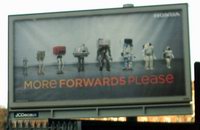January 11, 2007
Cute Robots, Nietzsche & Covenant: More Forwards Please
 I saw Honda's "More Forwards Please" ad on a billboard yesterday when I was in London to talk at the London Science Museum about cognitive enhancement (and AI). This is the more forwards please video. Very fitting.
I saw Honda's "More Forwards Please" ad on a billboard yesterday when I was in London to talk at the London Science Museum about cognitive enhancement (and AI). This is the more forwards please video. Very fitting.
Who can resist cute robots being well-behaved museum visitors? The whole pro-progress theme reminds me of Daewoo's great slogan:
We move because we hate the idea of standing still.
We create because we want something new in our life.
We take the next step because we want to rise above.
This is our mission, this is our passion.
The sceptical postmodern westerner immediately interjects: but to what end? All 'progress' isn't good! What is the content and context of all this?
But I think it misses the point. These two statements (besides trying to show that Honda and Daewoo are nifty and shiny) really expresses the true spirit of Nietzsche's concept of the 'will to power'. It is the will to become more, to expand oneself, be creative and use all one's abilities. I think it can almost be seen as a way of expressing flow although to Nietzsche it was much more, something acting both on lumps of matter and societies ("everything strives").
As Covenant sings in "Luminal":
I try to rise in pride, I want to radiate
walk on water and ride the light
I try to break the chains, I want to penetrate
cross the borders and drink the oceans
I need to burn my fuel, I want to detonate
melt the sun and drain the sources
I need to waste my strength, I want to escalate
turn the tide and conquer the stars
A pretty clear expression of the will to power.
It is amusing that most people who reflexively question the drive for "more forwards" think they are informed by the post-modern project. Because that project was to some extent built on the foundations of Nietzsche, and claims to accept a multiplicty of perspectives. How come progress must then be criticised so fiercely? To some extent it is of course the old struggle with modernism. But I think deeper down there is a conflict between a static, "the world should be as it is (and was meant to be)" view of the world and a dynamic "futurist" view that thinks "change is good". The traditional conservative, the communitarian who wants everybody cuddled down in a healthy community, the poststructuralist arguing against the precendence of any particular world interpretation, the romanticist environmentalist and the society-machine tinkering technocrat all think the current system is good or at least a safe bet. They might argue about the roles and ideal levels of religion, schooling, community, technology and economy, but they all agree on that truly new and changing things are disturbing or threatening. Meanwhile the dynamist loves change, because it means possibilities (change is always on the side of those who have no established position in the system), complexity and self-expression. Much of the "educated" scepticism against "naive progress" or "change for change's sake" is probably more about protecting positions and identities than a serious criticism. What would Nietzsche say?
I think change for change's sake has an undeservedly bad reputation. I think we need it to stay human. It is zest for life and learning. Anything new means that the range of human possibility has expanded a bit more, that there are more modes of human existence. And outside ourselves, the universe expands too:
I am not interested in things getting better; what I want is more: more human beings, more dreams, more history, more consciousness, more suffering, more joy, more disease, more agony, more rapture, more evolution, more life. David ZindellPosted by Anders3 at January 11, 2007 02:14 PM